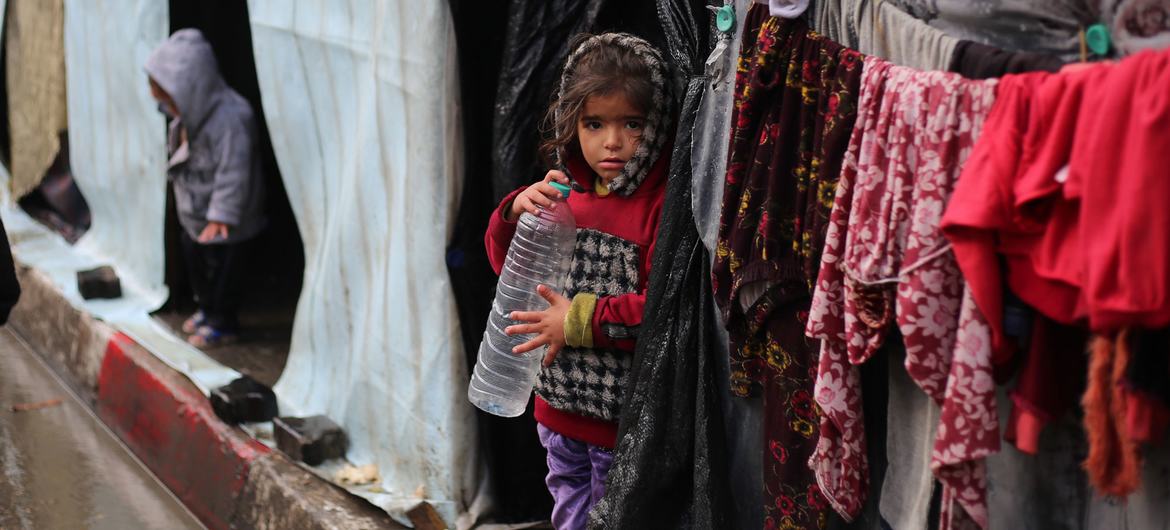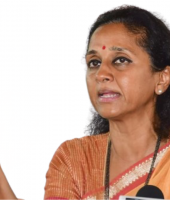Gaza: ‘The population is literally besieged’, UNRWA Deputy chief

In an exclusive interview, Natalie Boucly, the Deputy Commissioner-General of the UN agency for Palestine refugees (UNRWA), describes the desperate scenes she witnessed in Gaza, during a recent mission to the occupied Palestinian territory.
Ms. Boucly spoke to Khaled Mohamed from UN News as news emerged of fresh Israeli airstrikes on Gaza, and an UNRWA report that more children have been killed there in recent months than in four years of conflict worldwide.
On Wednesday, the agency reported that at least one of its staffers had been killed and a further 22 injured when Israeli forces hit a food distribution centre in the eastern part of Rafah on the southern edge of the Strip.
This interview has been edited for clarity and length
Natalie Boucly: Some 1.7 million people in Gaza, the vast majority of whom are in the southern city of Rafah, have been displaced by the conflict. One million of them are in schools or facilities that have been turned into UNRWA shelters, each of which houses, on average, 30,000 people.
The population is literally besieged. People are on top of each other. This creates a lot of issues with regards to sanitation, and there's a smell in Gaza from the open sewage which is flowing into the sea and diseases are on the increase. The despair is palpable there.
At the same time, I was full of admiration for our staff. UNWRA has been around for 3,000 employees who still work, day in and day out, providing services to the population. Six health centres are still operational, and we've got mobile teams going to the shelters giving 23,000 medical consultations every day.
Many of our colleagues have been displaced themselves. Their houses have been destroyed, they have lost family members and they’re living in tents, but they still get up every day and go and deliver for the population.
UN News: There are reports that a growing number of children dying from dehydration and starvation. What's your comment on this?
Natalie Boucly: What I saw myself is that there's just simply not enough aid coming in. Before the war, there were on average, 500 trucks coming into Gaza, including many from the private or commercial sector.
Today, it’s just a trickle, because the conditions and the circumstances are extremely challenging, in terms of the checkpoints and the controls which determine how aid gets in. And then inside Gaza it’s very difficult for the aid to reach the population, especially in the north, because of the security situation. There has been looting because of criminal gangs, and the desperation of the people.
More aid has to come in at scale, with another humanitarian pause or ceasefire.

UN News: Women as well in Gaza continue to bear the brunt of this war. What is UNWRA doing to support women?
Natalie Boucly: Women care for their children, for the elderly, for their parents, and so they are the ones who are visiting the doctors, seeking advice. Or they might be pregnant; there are around 60,000 pregnant women in Gaza. But there’s very little equipment and no electricity: generators and solar power are prohibited by Israel.
We work with partners to provide sanitary kits for women and assist them in the shelters, and we have a team ensuring, to the greatest extent possible, protection for women because the risks of gender based violence, in a situation where people are living on top of each other, is unavoidable.
UN News: What has been the impact of the funding freeze [which followed allegations by Israel that around a dozen UNRWA workers were involved in the 7 October Hamas attacks]?
Natalie Boucly: Altogether around half a billion dollars of funding was suspended. Sixteen countries decided to freeze or suspend their contributions to UNWRA. Some are coming back, some never left, and others increased their contributions. Thanks to those who came back, in particular the EU, Canada and Sweden, we were able to sustain our operations.
The freeze didn’t just impact Gaza. For example, we may not be able to get drugs for cancer patients in Lebanon or have children in school. We are working very hard with our donors, to see how they can come back to the table and continue to support us, because we play a critical and irreplaceable role during this humanitarian crisis.
UN News: Speaking of contributions, what's your take on the recent efforts to deliver humanitarian aid by sea and via airdrop?
Natalie Boucly: The needs are so immense that any methods of delivering aid are absolutely welcome, but airdrops are extremely expensive, and there are logistical and security risks associated with the maritime route.
We do insist that the safest and the cheapest way remains by land: we are calling for more land crossings to be opened by Israel, and for more aid to flow through the Kerem Shalom crossing. We also continue to call for Israel, as the occupying power in Gaza and as a member state of the UN, to ensure compliance with international law.
UNRWA has launched a Ramadan emergency food assistance campaign for Gaza. 100 per cent of contribution will go directly to people in need. Find out how to donate here.












Comment List